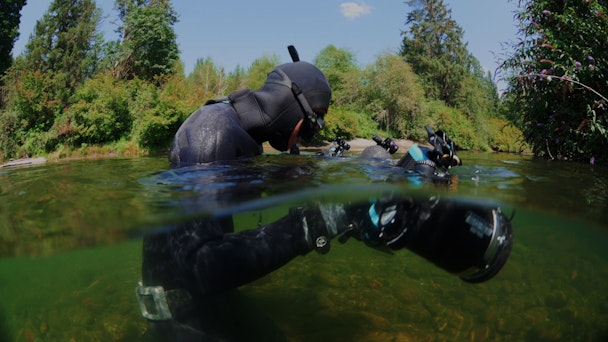Why brands like Patagonia and Nikon are using ad budgets to fund climate docs
Top brands are teaming up with new streaming platform Waterbear to fund award-winning documentaries on a wide range of issues.

A film about wildlife photography created with Nikon is hosted on Waterbear / Waterbear
Dubbed the ‘Netflix for nature,’ Waterbear wants purpose-led brands to funnel their ad spend into documentaries, saying it’s an opportunity for them to progress their climate comms beyond ad campaigns. So what’s in it for them?
Its chief growth and impact officer, Poppy Mason-Watts, tells The Drum that the platform was founded in 2020 on the concept that stories are entertaining, inspiring and can change people’s behaviors. The certified documentaries and films it hosts can all be viewed for free by the platform’s three million users.
Advertisement
“When we launched, we called ourselves ‘Netflix for nature,’ but we’re more than just nature – our stories span climate change and biodiversity loss as well as social justice and mental health,” Mason-Watts adds.
But in recent years, the likes of Netflix and Amazon Prime have woken up to the appetite for this kind of content and have been fighting for the streaming rights to social justice and climate-related documentaries. This increased competition isn’t a problem for Waterbear, with Mason-Watts saying that viewers are too often left feeling deflated, rather than empowered, after watching on another streaming service because they don’t know what action to take next.
“[After watching on Netflix], you might want to do something, but it’s an overwhelming experience to find out how. We harness that inspiration in real-time and give people the tools to take action," she explains.
It does so by incorporating calls to action throughout its films, sending viewers to petitions they can sign, information they can download and NGOs they can support to further the causes that speak to them. Waterbear tells The Drum it’s then able to analyze what will get audiences to take action by measuring not only the number of views but the watch time, completion rate, number of shares, signatures of petitions as well as increases in donations and volunteering and evidence of policy changes.
The free service is available on all mobile devices and multiple television hosts, including SamsungTV, LG and Rakuten. Free-to-use usually comes with the trade-off that a user will be served ads but Waterbear decided from the outset it wouldn't rely on that model.
“We want to stay free for as long as possible because we don’t believe people should pay to watch documentaries. We don’t believe people should have to pay to save the planet. It’s as simple as that,” says Mason-Watts.

Skeptics might be wondering how it makes any money at all. Instead of commercials, Waterbear works on a brand-funded model where advertisers support filmmakers on the issues they want their brands to be associated with.
“We’re working with major household names to encourage them to tell a documentary story, not their story,” says Mason-Watts. “We’re not interested in a brand supply chain story or the chief sustainability officer talking about how great the brand is. We are interested in whether a brand says they care about single-use plastic, matching them with an NGO and connecting them with filmmakers to tell real, authentic and purposeful documentary stories.”
Mason-Watts says the reality is that brands have power: “They’re more trusted than NGOs, than politicians and even the media. If we can harness that power for good, we can move them into really powerful storytelling and away from this endless cycle of brands funneling cash into paid-for impressions.”
Advertisement
Brands can see the benefits
But investing in long-form content isn’t necessarily a purely altruistic endeavor for these brands. “By showing that you care about something, brand engagement goes through the roof,” she says. “Sales might not go up right away, but I think we need to move on from the idea that investing in proper climate communications isn’t going to help the business because it’s not driving obvious revenue.”
“Brands that have funded WaterBear content so far include Nikon, Fairphone, Jack Wolfskin, Beginning Node, Luminate, Ellen MacArthur Foundation and Ecologi and brands that have distributed content on the platform to drive impact include Patagonia and Rolex, among others.
Julian Harvie, marketing director for Europe at Nikon, worked with Waterbear on several films about the importance of wildlife photography. He says no previous partnership “has generated the same level of engagement and enthusiasm, and Nikon now has a vessel upon which to carry its own sustainability story" and engagement garnered by the documentaries has paid off.
In two interviews for graduate roles, he added that young marketers said they wanted to work at Nikon precisely because of its partnership with Waterbear. “So it’s had an impact at multiple levels. Businesses need to walk the walk with the next generation of employees because people want to work for brands with the proper authentic alliance to impact and purpose,” he continues.
Mason-Watts says that marketers will still want brands to report the traditional marketing metrics, but “we’re championing impact measurements like trees in the ground, petitions signed. This is something one of our brands, Rolex, now includes in their annual reports, which is very cool.”
NGOs and filmmakers also see the benefit. Not only does Waterbear ensure its film crews are sourced from the filming locations (to keep carbon emissions low and improve representation in the filmmaking industry), but they also see increased engagement from the general public. “Since the film went out on Waterbear, there has been a steady amount of donations. Without its support and the click-through link, none of this would have been possible,” said a team member behind Saved by Jane, a film about Jane Baker, founder of Starfield Farm Animal Sanctuary.
Suggested newsletters for you
Keeping standards high
Once live, the films are distributed across Waterbear’s platform and can live on the brand’s social platforms. Mason-Watts says the Waterbear team feels comfortable with this arrangement due to its internal, rigorous editorial standards dubbed the ‘Moral Compass.’
“It means that any organization we’re considering working with has its suitability decided by the whole team – everyone has a vote. If they don’t pass the test, even if they’re offering us heaps of cash, we won’t work with them.”
Waterbear is also certified B-Corp, meaning it has legally committed to refusing work from the defense, firearms, gambling, hazardous materials, pornography, prisons or tobacco industries. Mason-Watts adds that it has its own policy on not working with oil firms and “certain other major companies because we don’t want to get into the world of greenwashing at all.”
“I guess it’s not advertising in the traditional sense, but it’s a way of integrating into your pre-existing content,” she concludes.
In the future, Mason-Watts hints at Waterbear’s brand partnerships moving beyond documentaries and into animation, reality content, docu-sci-fi and docu-fiction. “We’re playing with these formats because we know everyone cares about something; we just need to harness it.”
Want to learn more about the most important issue of our time? Senior reporter Ellen Ormesher explores the role of advertising and marketing in the climate crisis. Get the briefing here.

